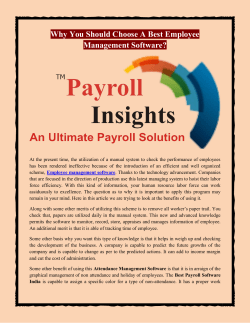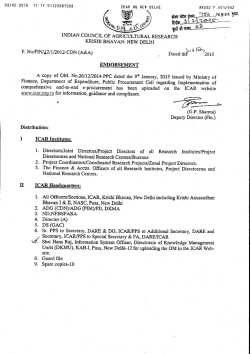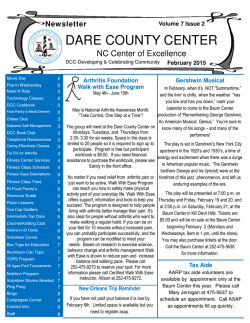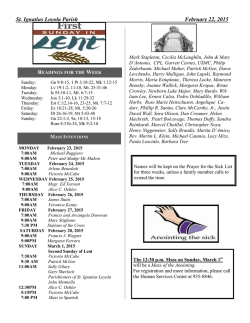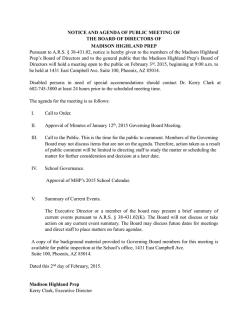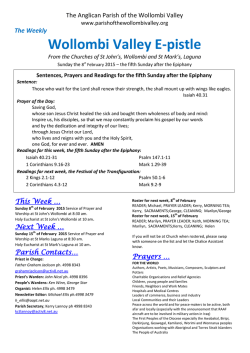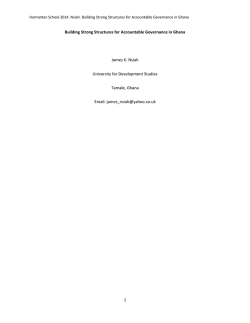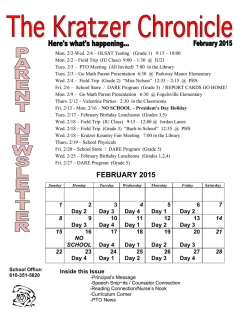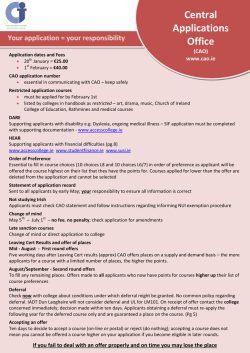
6.4 Supervision Strategies (revised)
Strategies for Successful Supervision and Team Collaboration A DA M ME YE R U N I V ERSITY OF CE N T RA L F LOR I DA A DA M. MEYER @U CF.EDU Books to Reference Crucial Conversations (Kerry Patterson et al) Crucial Confrontations (Kerry Patterson et al) --- 2nd Version: Crucial Accountability The Speed of Trust (Stephen M.R. Covey) Dare to Serve: How to Drive Superior Results by Serving Others (Cheryl Bachelder) The Servant Leader: A Simple Story About the True Essence of Leadership (James Hunter) Good to Great (Jim Collins) Puzzle of Motivation (Daniel Pink Ted Talk, based on his book Drive) Leadership is an Art (Max DePree) Your Motivation What is your motivation as a leader? Protect yourself You or others in the spotlight? Make yourself look good Serving students? Staff? Faculty? Yourself? Make others look good Fear Love Self-ambition? Ambition to serve others? Make it better Be the creative voice or the one who facilitates creativity? Power Grabber or Power Giver? ?????????? The reality… Others know (or assume) your motivation even if you do not. Do you want to decide what is your motivation or leave it to others? Leadership How do you define leadership? What are some of the things you appreciate (appreciated) about your favorite supervisor? What are/were some of your greatest frustrations in working with your least favorite supervisor? Leadership defined here… The skill of influencing people to work enthusiastically toward goals identified as being for the common good. Leadership… • Revolves around character • Can be learned and developed by anyone • Effectively utilizes authority -- The Servant Leadership The true measure of leadership is influence; nothing more, nothing less. -- John Maxwell Power of Influence If you have 5 full-time people looking to you for leadership, in the year ahead you will have 10,000 hours of influence opportunity. -- Dare to Serve Trust You Need To Establish Trust The ability to establish, grow, extend, and restore trust with all stakeholders is the KEY leadership competency… Every interaction with every person is a “moment of trust.” The way you behave in that moment will either build or diminish trust. --Stephen M.R. Covey What people want to know… Do you care for me? Can you help me? Can I trust you? If you are a supervisor… The answer to… “Do you trust your boss?” …is more predictive of team and office performance THAN ANYTHING ELSE! Could It Be This Simple? When we believe that people are truly acting in our best interest, we tend to trust them. When we believe they are not acting in our best interest (or we may not be sure of the intent), we do not trust them. --Stephen M.R. Covey Trust is a function of 2 things… CHARACTER •Your integrity •Your motive •Your intent with people **Constant** Violation = quickest way to decrease trust COMPETENCE •Your capabilities •Your skills •Your results •Your track record **Situational** Quickest way to increase trust Great Way to Show Competence Under-promise & Over-deliver Your intent creates the greatest trust when your… • Motives (your why) are consistently about the genuine care of others • Agenda is one that seeks mutual benefit • Behavior is focused on the best interest of others 13 Critical Behaviors from The Speed of Trust 1. Talking Straight (honesty in action) 2. Demonstrate Respect 3. Create Transparency (through authentic communication) 4. Right Wrongs (immediately) 5. Show Loyalty (give credit to others; talk like they are in the room) 6. Deliver Results 7. Get Better (through continuous improvement) 8. Confront Reality (elephants in room, sacred cows, that which cannot be discussed) 9. Clarify Expectations 10. Practice Accountability for self and others (easier when #9 happens) 11.Listen First (with ears, eyes and heart so you know what matters) 12.Keep Commitments 13.Extend Trust as appropriate High-Trust Organizations… • Share information openly • Share credit abundantly • Tolerate mistakes as means of learning • Practice transparency • Promote innovation and creativity • Hold people accountable • Confront real issues • Have real communication and real collaboration • Have authentic people • Have a vitality and an energy that can be felt How are you actively building trust? Flow What is Flow? •Mental state of operation in which the person is fully immersed in what he or she is doing •Feeling of energized focus, full involvement, and success in the process of the activity •Completely focused motivation •The hallmark of flow is a feeling of spontaneous joy, even rapture, while performing a task Proposed by Mihály Csíkszentmihályi Love I do not have to necessarily like my players and associates, but as a leader I must love them. Love is loyalty, love is teamwork, love respects the dignity of the individual. This is the strength of any organization. -- Vince Lombardi Reframing Love • Common in English language: Love is a feeling • Reframe: Love is a behavior, an action (Agape love) • Patience • Kindness • Humility • Respectfulness • Selflessness • Forgiveness • Honesty • Commitment A team member or employee motivated by fear, force or any other form of manipulation is not that same as a team member motivated by love or the knowledge that someone cares about them. -- Zach Thomas More than Money Intrinsic Motivation is Critical Autonomy • The desire to direct our own lives Mastery • The desire to get better and better at what we do that truly matters Purpose • The yearning to do what we do in the spirit of something larger than ourselves Traditional management is great for compliance. Self-direction works better for employee engagement. -- Daniel Pink Help Them Reach Goals, Even if it Means They Leave Growth Mindset •How can you make each person better? •What are your colleague’s… • Short-term goals? • Long-term goals? • Work Passions? • Work Strengths? • Obvious places where they can contribute in the office operations? Individual Connection Must connect with each employee individually…each have unique needs Think UDL -- Universal Design for Leading Examples… • Develop presentation skills? • Develop programs? • Organize events? • Enhance office processes and policies? • Database management? • Get involved in committees on campus? • Assistant Director? • Director? • Leaving disability field for something else? Leaders owe people space, space in the sense of freedom. Freedom in the sense of enabling our gifts to be exercised. -- Max Depree None of us is as smart as all of us. Understanding and accepting diversity enables us to see that each of us is needed. It also enables us to begin to think about being abandoned to the strengths of others, of admitting we cannot do everything. -- Max DePree Of all of the bad ideas circulating the grapevine, pretending that leaders must know everything is among the most ridiculous and harmful. Leaders earn their keep, not by knowing everything, but by knowing how to bring the right combination of people (most of whom know more about certain topics than the leader) and propel them toward common objectives. It is okay to say, “I do not know. Ideas anyone?” -- Crucial Confrontations Ultimate Leadership Goal To have your boss come into your office and tell you that you mentored someone so well that they will now be better in your position than you…so get out Leaders leave behind a positive influence when they leave and the office builds on the leader’s work and flourishes Supervising Challenging Employees or Challenging Situations What are some challenges you experience in supervising employees? 4 Possible Roots of ‘Challenging Employees’ 1. Me 2. Unmet Expectations 3. Lack of skill 4. Lack of motivation Me •Our attitude toward others plays a large role in other’s performance results •Everyone is a valuable member of the team…do you think that? •Where am I the person’s barrier to great performance? •Where have I failed to communicate or act in the manner needed for that person’s success? Most leaders can tell you the weaknesses of their team members. But can you cite the strengths and talents of your team? Are you accessing their very best capability? -- Dare to Serve So much of what we call management consists in making it difficult for people to work. -- Peter Drucker Unmet Expectations •Expectations clearly outlined but not followed •Expectations not clearly outlined, likely assumed and subsequently not met The ability to hold others accountable lies at the very center of a person’s ability to exert influence. -- Crucial Confrontations The Reality of Poor Performance For people to behave badly (and/or to not meet our expectations) over the long haul, WE have to do 2 things: 1. We choose to avoid the conversations we need to have. • Keeps people from seeing the true consequences and impact of their actions 2. We create a work-around that enables others to continue doing what they are doing (namely unproductive and possibly negative actions). -- Crucial Confrontations Lack of Skill and/or Motivation? •Does the employee have the right skill set for the task(s) at hand or the overall job? •Does the employee have the right motivation? • No one wants to do overly hard, noxious, boring or unimportant work. •Get the right people on the bus and get them in the right seats. (Jim Collins) Skill and Motivation are Often Interwoven •Is it the chicken or the egg (skill or motivation) as to why the staff member is not performing to expectations? • Keep in mind ‘Flow’ concept Identify challenges with THEIR input, not based on your assumptions and judgments alone • Involving others in the solution empowers others, creates motivation and creates mutual understanding of expectations • “What will make this better for you?” Don’t Forget the Role of Me Ask the employee: • Where am I contributing to this challenge? (and desire honest feedback) • What can I do to assist? • If our roles were reversed and you were supervising me in this situation, what would you tell me? How would you work with me? Consider the Critical Role of Environment We often assume that people act the way they do because of uncontrollable personality factors (their disposition) as opposed to doing what they do because of forces in the environment (the situation). It is easy to see other’s actions only while we are acutely aware of forces behind our choices. -- Crucial Confrontations Remember: We are each a force in our environments Environmental Wonders… •What other sources of environmental influence may be impacting this person? • Work systems • Physical design/space layout • Polices and procedures • Cultural expectations and assumptions • Organizational supports (or lack thereof) • Chain of command • ???? Dig Deeper •What is their assessment of the situation? •What environmental factors are contributing to their actions? •What role am I playing? •What am I missing in my assessment? Consider beyond the typical “Gee, what in the world is wrong with them?” It is the Problem, Not the Person •When discussing work problems, let the person know you see them as a person of value and worth who is currently unable to meet expectations… • And you want to help the person as best as you can •Keep the focus on the problem, not the person • Helps other person feel safe in the conversation Use CPR Approach •Content – focus on the facts of the matter •Pattern – explain what see happening over time •Relationship – explain impact of the problem on our relationship (which offers the biggest impact in awareness and understanding) What is going on? Are you okay? How can I help? What am I missing here? Follow-Up •Who does what by when •Maintain accountability Keep It Fun Make Monday morning as pain-free as possible. Give Thanks Gratitude is the most effective currency for helping people perform at their best. -- Michael Hyatt Sharpen Your Skills Leadership and Supervision are Skills •To improve requires intentional effort •Feedback •Reading •Mentoring •Workshops •Reflection •??? No matter how good you think you are as a leader, my goodness, the people around you will have all kinds of ideas for how you can get better. So for me, the most fundamental thing about leadership is to have the humility to continue to get feedback and to try to get better because your job is to try to help everybody else get better. --Jim Yong Kim Closing Thoughts to Consider… In the end, it is impossible to have a great life unless it is a meaningful life. And it is very difficult to have a meaningful life without meaningful work. -- Good to Great It is the leader’s responsibility to bring purpose and meaning to the work of the organization. -- Dare to Serve Holding Yourself Accountable Based on this presentation, what is one next step you will commit to completing by next Friday? • Order a book to read • Review this presentation and take more thorough notes, map out a game plan, etc. • Find a mentor • Have a conversation with a mentor • Journal • Have a conversation with an employee • ???? Questions?
© Copyright 2026
